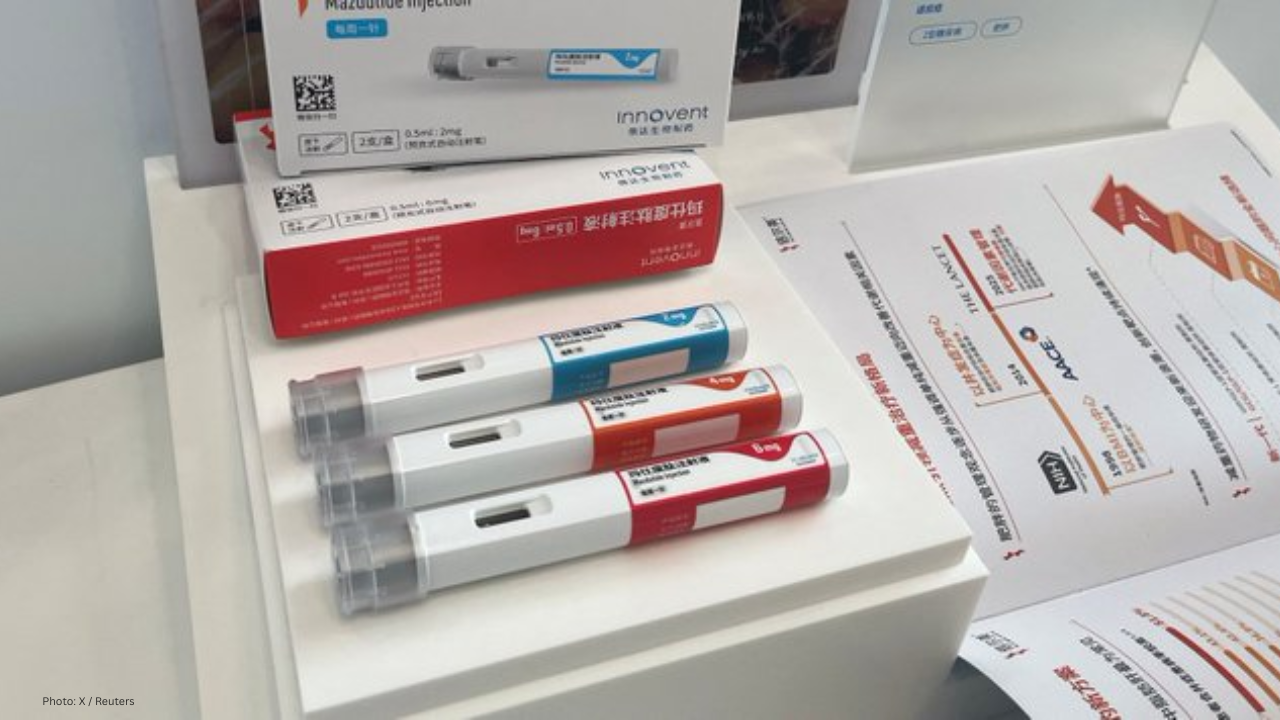
Post by : Naveen Mittal
Innovent Biologics, a Chinese pharmaceutical company, is moving forward with the development of its GLP-1-based weight-loss treatment. The drug represents China’s effort to tap into the fast-growing global obesity management market, which is dominated by international players like Novo Nordisk. However, entering this competitive arena has proven challenging, as Innovent faces both regulatory hurdles and the need to differentiate its product from established competitors.
Weight-loss medications, particularly GLP-1 receptor agonists, have gained traction worldwide due to their ability to curb appetite and promote sustained weight reduction. With rising obesity rates in China, local pharmaceutical companies like Innovent see both a public health imperative and a commercial opportunity to deliver effective solutions domestically.
While Innovent has successfully developed the treatment, it must navigate a complex regulatory framework to secure approval for public use. China’s drug regulatory authorities have become increasingly cautious with weight-loss medications due to concerns over side effects, long-term safety, and proper patient selection.
Experts note that while the approval pathway exists, the scrutiny is high, especially given the global attention on GLP-1 drugs. Innovent will need to present robust clinical trial data demonstrating safety and efficacy for its treatment to gain approval and compete credibly against international alternatives.
Novo Nordisk, the Danish pharmaceutical giant, currently dominates the GLP-1 segment with its blockbuster semaglutide and related products. The company has not only secured strong brand recognition but also built an extensive distribution network in China, creating a high barrier for local entrants.
Analysts suggest that Innovent must differentiate its drug either through pricing, accessibility, or specific patient-focused advantages to capture meaningful market share. Competing against an entrenched global player will require strategic partnerships, aggressive marketing, and sustained investment in real-world evidence to prove effectiveness in Chinese patients.
Despite the challenges, the China weight-loss drug market represents a significant commercial opportunity. The growing prevalence of obesity and metabolic diseases is driving demand for effective pharmacological interventions. GLP-1 drugs, in particular, are seen as life-changing for patients struggling to manage weight through diet and exercise alone.
Innovent’s strategy could include leveraging local clinical data to highlight efficacy and safety in Chinese populations, emphasizing affordability compared to imported treatments, and targeting urban centers with high obesity prevalence. Success in China could also pave the way for regional expansion into other Asia-Pacific markets.
Industry observers note that Innovent’s efforts highlight a broader trend: Chinese pharmaceutical companies are increasingly entering specialized treatment areas traditionally dominated by multinational firms. This signals growing capabilities in biopharmaceutical research, clinical trial execution, and commercialization strategies.
However, experts caution that regulatory approval alone does not guarantee commercial success. Market penetration, physician adoption, and patient trust are equally critical. Innovent will need to prove that its drug not only works in trials but also delivers meaningful outcomes in everyday clinical practice.
Innovent’s weight-loss drug is at a critical juncture. Approval in China would mark a major milestone for the company and demonstrate that local pharmaceutical firms can compete in high-stakes therapeutic areas. At the same time, navigating competition from global incumbents like Novo Nordisk will require a combination of scientific excellence, strategic marketing, and strong regulatory navigation.
The coming months will be telling, as Innovent continues clinical trials, engages with regulators, and prepares for potential commercial launch. Observers are watching closely to see whether this homegrown GLP-1 therapy can capture a share of the rapidly growing obesity treatment market in China.
innovent, weight loss drug, glp-1, obesity treatment, china pharma, novo nordisk, semaglutide, healthcare industry










Sinner & Swiatek Shine at China Open: Semifinal Spots Secured
Jannik Sinner and Iga Swiatek advance to the semifinals at the China Open. Read about their victori

Michigan church attack kills 4, injures 8 in shocking violence
A gunman drove into a Michigan church, fired shots, set fire, killing 4 and injuring 8 before police

Moldova’s Pro-EU Party Secures Majority in Key Vote
Moldova’s pro-European PAS wins a strong majority in the parliamentary election, weakening pro-Russi

Gabriel’s late header gives Arsenal 2-1 win at Newcastle
Arsenal snatch dramatic 2-1 win at Newcastle as Gabriel heads the winner in stoppage time; Merino eq

Air France Flight 447 Trial Opens 16 Years After Tragic Crash
Sixteen years after the Air France Flight 447 crash, a trial opens against Air France and Airbus. Le

Europe close to Ryder Cup win after strong weekend play
Team Europe is on the verge of winning the Ryder Cup, showing great form in Italy and needing only a